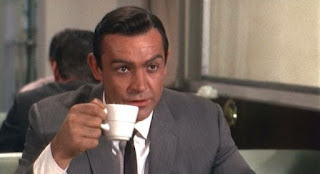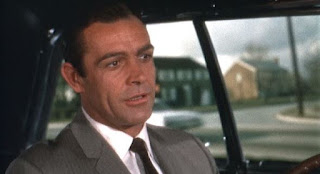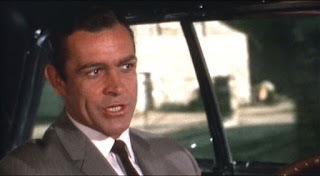The Story: So, remember, last week? That scene from To Catch a Thief? Pretty lightweight stuff, even comedic. Socialite Frances Stevens (Grace Kelly) comes across jewel thief Jon Robie (Cary Grant) and makes it her business to get at his truth and simultaneously seduce him. Lightweight, except that when you think about it, there's something seriously wrong with Francie—she meets a thief and is turned on by it, by him, and makes it her business to seduce him. Sure, he's Cary Grant, but...that's not normal!
It's pretty seriously cracked...like those women who become attracted to jail-birds, even notorious serial killers, and will go so far as to marry them. That's...just...crazy. And yet, it happens...all the time. We may not understand it, but there is some motivation that's unfathomable—reflected celebrity? a "relationship" with someone safely imprisoned? a relationship that can't be consummated?—that makes it happen. Francie is seriously weird. Jon Robie knows it and calls her out on it. But, they still end up together, anyway. Certainly, Hitchcock has dollied his camera through some weird psychological territory before, but...this stuff is twisted, even in a "lightweight romp" (as the critics at the time dismissed it) as To Catch a Thief.
Well, what's good for the goose... Here, Hitchcock switches sexes in his "Suspenseful Sex Mystery" Marnie. It is the male of the species—and in Sean Connery, it's very male*—that falls under the spell of a kleptomaniac, Margaret "Marnie" Edgar. Why? She's attractive—she's 'Tippi' Hedren. But, she's also a serial thief AND HE KNOWS IT! She's robbed from him, but this is not for revenge. Is it that "white knight syndrome?" where he sees a "bird with a wing down" (as Ian Fleming, James Bond's creator, called it) and is impelled to come to the rescue?
I don't know. But, it's weird. And fascinating.
Here's how Hitchcock described it (rather crudely) in the interview book "Hitchcock/Truffaut" (p. 227): "The fetish idea. A man wants to go to bed with a thief because she is a thief, just like other men have a yen for a Chinese or a colored woman." Truffaut asked: "Why is Marnie's hero so attracted to the girl? Is it that she depends on him because he knows her secret and can turn her over to the police, or is it simply that he finds it exciting to go to bed with a thief?"
Hitchcock replied: "It's both of those things. Absolutely."
Well, not "absolutely". The picture changes it when you look at it less as a fetish idea, and more of an issue of control, the way we now recognize that most problems between the sexes occur. Connery's Mark Rutland (you thought only Bond movies had suggestive names?) recognizes the woman "Marnie" from her working at another business establishment that got robbed. When she shows up at his business, he hires "the one with the legs" and after his place is robbed, he pursues her and runs her to ground.
Look at it now. From Marnie's perspective. She's perfectly capable. Independent. Not dependent. Lives a good, if complicated, and transitory life. Does he pursue her because she's a thief? Or because he wants to take away her own control? Take away her agency? Put her under lock and key—his, rather than the police.
Connery's inherent predatory persona fits well, but the rather dreamy way he describes his plans for marriage, and the almost jocular way he treats the subject—"It's horrible, I know. But I do love you." He just doesn't love her the way she is. He wants her under his thumb. And, of course, it's couched as being "for her own good." Think it's creepy? Me, too!
Control. Hitchcock's own history of employing actresses, finding them, grooming them, changing them, and being disappointed when he lost them for roles in his movies...to pregnancy, to other work commitments, to Monaco—names like Miriam Hopkins, Ingrid Bergman, Vera Miles, Grace Kelly**—is well documented. He had signed 'Tippi' Hedren*** (real name: Natalie Kay Hedren—'Tippi' was her stage name, an alias...like "Marnie") to an exclusive contract in which he controlled all aspects of her acting life, and then tried to impose them on her personal life, as well. Diane Baker, who co-starred in Marnie was shocked at how isolated Hitchcock kept Hedren on the set. All conferences between them were private. No one was to make contact or "distract" her without the director's say-so. All for the performance. All for the movie.
All for the director. Hitchcock was a very capable one, but a very insecure man. It's what gave him great ideas and could communicate them so palpably to audiences. But, the insecurities and the neuroses were there, right on the surface. And although he was "Master of Suspense," he never really mastered his demons.
It made great art. But it didn't placate him.
Marnie was given mixed reviews at the time of its release, but one can now see it—along with Vertigo—as being one of his most personal, and self revelatory, films...whether he intentionally did so or not.
The Set-Up: (Taken from the film's description in "Hitchcock/Truffaut") "Marnie ('Tippi' Hedren) is a thief, Her modus operandi is to change her identity as soon as she has committed a successful robbery and then move on to another job. Though Mark Rutland (Sean Connery), the head of an important firm, recognizes her from a previous encounter, he says nothing and hires her as a secretary-bookkeeper. He is clearly attracted to the girl, but she ignores his attentions and soon disappears with the contents of the company safe."
"Mark discovers the theft, replaces the stolen money and manages to track Marnie down."
At a diner, he has just finished explaining to her how he has managed to find her. Now...for the dessert course.
Action.
MARK: Uh-uh.
MARNIE: That is...
MARK: The name. Marnie. Yes, I'll just go on
calling you Marnie.
That's easily explained. Pet name.
But the Taylor.
MARK: We'll just have to marry you off
as Mary Taylor. It's perfectly legal.
You can sign yourself Minnie Q Mouse
on a marriage licence,
MARK: you're still legally married.
MARK: I doubt that you do, Marnie. In any event, we'll just have to deal with
whatever it is that you are.
MARK: Somebody's gotta take on the
responsibility for you, Marnie.
MARK: And it narrows down to a choice of
me or the police, ol' girl.
Words by Jay Presson Allen
Pictures by Robert Burks and Alfred Hitchcock
Marnie is available on DVD and Blu-Ray from Universal Home Video.
* "How do you expect me to 'act frigid' around him", Hedren was heard to ask Hitchcock. "Have you seen him?" Hitchcock replied, "Yes, my dear, it's called acting..."
** For Marnie, Hitchcock almost managed to get Grace Kelly to return from Monaco to play the role. She was signed, but her subjects objected, and so she was forced to turn it down. Marilyn Monroe, Eva Marie Saint, and Susan Hampshire all lobbied for it. Catherine Deneuve has said she would have done it in a heart-beat. In the end, Hitchcock chose Hedren.
***'Tippi' Hedren's always appeared with only one slash for each quotation mark. That was Hitchcock's idea. Talk about controlling.
































































































Hunh - we just watched Marnie the other day. It is creepy. BTW, I don't understand this footnote:
ReplyDelete***'Tippi' Hedren's always appeared with only one slash for each quotation mark. That was Hitchcock's idea. Talk about controlling.
Oh, that's easy. Instead of being listed as "Tippi" Hedren, Hitchcock insisted-as part of her contract-that she go as 'Tippi' "because it was distinctive."
ReplyDeleteAh so!
Delete